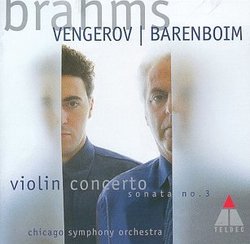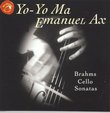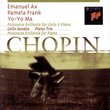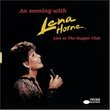| All Artists: Johannes Brahms, Daniel Barenboim, Chicago Symphony Orchestra Title: Brahms: Violin Concerto; Sonata No. 3 Members Wishing: 0 Total Copies: 0 Label: Teldec Release Date: 1/26/1999 Genre: Classical Styles: Chamber Music, Forms & Genres, Concertos, Instruments, Strings, Symphonies Number of Discs: 1 SwapaCD Credits: 1 UPC: 706301714423 |
Search - Johannes Brahms, Daniel Barenboim, Chicago Symphony Orchestra :: Brahms: Violin Concerto; Sonata No. 3
 | Johannes Brahms, Daniel Barenboim, Chicago Symphony Orchestra Brahms: Violin Concerto; Sonata No. 3 Genre: Classical
The inside covers of this CD's booklet show violinist and conductor engaged in a whimsical pose of arm wrestling. It's a curious visual misnomer for the actual character of the Brahms Violin Concerto, which is notably not ... more » |
Larger Image |
CD DetailsSynopsis
Amazon.com The inside covers of this CD's booklet show violinist and conductor engaged in a whimsical pose of arm wrestling. It's a curious visual misnomer for the actual character of the Brahms Violin Concerto, which is notably not cast as a bravura showdown between soloist and orchestra. Rather, as this live performance recorded in Chicago Symphony Hall in 1997 so amply demonstrates, the score's beauty and fascination emanate in large part from its spaciously symphonic conception. Maxim Vengerov imbues his account with all the variety of expressive color, intellectual weight, and deeply personal statement necessary to make Brahms's poetry vivid--he even supplies his own cadenza in lieu of the usual one by Joachim--yet never detours from the larger vision at stake. The first movement's coda in fact creates the sensation of a beguiling reverie from which both violinist and ensemble are reluctant to awaken. Gently tapered phrasing from Vengerov, together with Daniel Barenboim's attention to the gorgeously crafted woodwind scoring, creates a statement of lofty serenity in the Adagio. And in the finale, where performances too often tend to sound watered-down after the weight of what has preceded, bold, snappy accents ensure an exhilarating momentum. A more intimate example of the synergy between Vengerov and Barenboim can be heard in Brahms's D Minor Violin Sonata. In contrast to Anne-Sophie Mutter's huge, luxurious sound, Vengerov brings a more introspective but no less passionate demeanor to bear. Despair and peace alternate with moving contrast in this superb work, which has been interpreted as a character portrait of its dedicatee, conductor Hans von Bülow. --Thomas May Similarly Requested CDs
|
CD ReviewsBrilliant execution of romantic standards. Paul Geffen | 02/10/1999 (4 out of 5 stars) "Maxim Vengerov is a talented and thoroughly modern performer. In this recording he takes on one of the landmarks of the 19th-century Romantic repertoire.This Brahms Concerto opens in stately fashion, measured and careful. The violin's entrance is brisk, raising hopes of more excitement to follow. But the conductor manages to keep a tight rein on the proceedings. A range of moderate to slow tempos are maintained throughout the performance, which is one of the longest on record.In general, Vengerov plays with great precision but little warmth; instead he displays a steely brilliance. He often sounds hurried even when he is not playing fast. Barenboim seems to be holding back the tempo whereas the soloist seems to want to go faster. In the second movement, the combination of a slow tempo and very smooth playing from both soloist and orchestra results in a mood that borders on the soporific. By the end of it I was so relaxed that the aggressive opening of the third movement came as something of a shock.Vengerov's tone recalls that of the young Heifetz: it is precise and intense, with little of what now would be considered Romantic excess. In fact, Vengerov gives the piece a Nordic, Sibelian sound, which is unusual and unexpected for the music of Brahms.The soloist plays his own cadenza, which is simple and unadventurous, never going far from the motifs in the score.Overall, Vengerov's interpretation is thoughtful, considered, and deliberate. Its appeal is subtle, not very exciting on the surface but complex, refined, and artful. Barenboim and the Chicago Symphony contribute a firm foundation, not as driven as Reiner (with Heifetz) but not plodding either.The whole thing is very sleek and modern-sounding. The recorded sound is clear and detailed, instruments are well located and represented. The liner notes indicate that this was taped "live," but there is absolutely no audible sign of an audience.--------------------------------------------------------------------------------Many of the same comments regarding Vengerov also apply to the Sonata, recorded a year later in the studio. Here the violin sounds sweeter, and there is more involvement and risk-taking on the part of both performers. Barenboim again provides solid backing, but this time he seems to enjoy what he's doing and does not make it sound so serious. His keyboard playing is for the most part delicate and controlled. The impressive variety of tone colors and effects tell of his years as a keyboard soloist.Vengerov too produces a remarkably wide range of timbres from his extraordinary instrument. This range is all the more apparent when he does not need to compete with a full orchestra. And in the Sonata Vengerov is able to exploit the lower ranges of his instrument more effectively than in the Concerto.Tempos in the Sonata are for the most part moderate and relaxed. The finale is spirited and (dare I say?) passionate. This contrast is especially effective because of the restrained approach to the rest of the piece.Don't be put off by the slightly menacing cover photo. This is serious, honest, and reliable music-making." A Definitive Performance of Brahms' Violin Concerto John Kwok | New York, NY USA | 04/20/2001 (5 out of 5 stars) "Among the great recordings of Brahms' Violin Concerto this recent Teldec CD has to be regarded as definitive. Vengerov gives an electrifying, compelling performance that is served well by the Chicago Symphony Orchestra's warm, brilliant playing. Vengerov's playing has a steely edge to it, which sounds Nordic, not Germanic, in tone, but it doesn't lose the lyricism which this piece demands. His performance ranks with Grumiaux's and Perlman's; all others pale by comparison. Somehow he strikes a balance between Grumiaux's warm, vibrant playing and Perlman's exuberance tinged with warmth. And he is brash enough to perform his own cadenza, which sounds as compelling as Joachim's. Barenboim is a compassionate interpreter of Brahms, yet he opts for a subdued, relaxed mode of conducting during the first two movements, before adopting a frantic, almost Bernsteinesque pace. This may be the only great recording of Brahms' Violin Concerto which has a compelling performance of one of Brahms' Violin sonatas. Barenboim is the ideal accompanist, playing with drama and warmth akin to Arrau's and Kempff's, yet with ample restraint with regards to Vengerov's playing. Here, Vengerov's violin sounds sweeter and more lyrical, in stark contrast to his performance of the concerto.Teldec's engineers have recorded a live performance that sounds as crisp as any studio recording. The sound quality is impeccable; it is as though I was present at Symphony Hall the night of the performance. While I can recommend other recent recordings of Brahms' Violin Concerto with Kremer and Mutter as soloists, this has to be regarded as first choice. It belongs in your CD collection alongside the classic recordings of Grumiaux accompanied by Sir Colin Davis and the Philharmonia Orchestra and Perlman with Carlo Maria Giulini and the Chicago Symphony Orchestra." Brahms both laid-back and passionate Paul Geffen | 02/15/1999 (5 out of 5 stars) "This recording is taken from a live performance, and those who attended the concert have been avidly waiting for this document. (Folks at the CSO's store claim they could barely get the CDs out of the box before people grabbed 'em.) It does not disappoint. Brahms wrote this concerto for his long-time friend and musical partner Joachim, and it shares the same key as the contemporary and pastoral Second Symphony. With an expert violinist prompting him, Brahms produced one of his finest works. Barenboim's tempos are relaxed in the first two movements, driven in the third, and Vengerov brings his usual range of colors and intensity to the solo part, especially enhancing the "Hungarian" quality in the last movement (Brahms, after all, wrote a lot of music with the designation "ala Ungarese" and this movement has that kind of energy here). The D-minor sonata is also filled with both lyrical beauty and driving energy. Let's hope that these two musicians will continue to work together in the future."
|

 Track Listings (7) - Disc #1
Track Listings (7) - Disc #1








